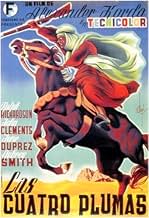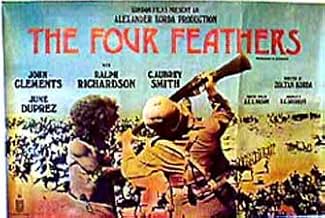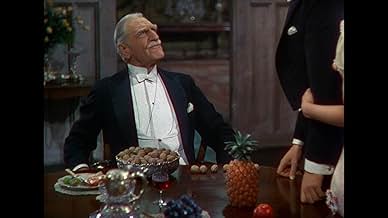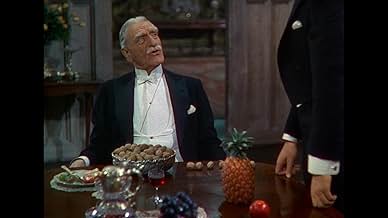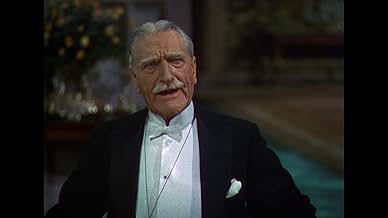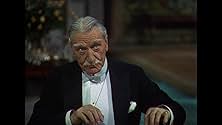A British Army officer resigns, burning his last-day summons to war in the Sudan. Accusing him of cowardice, his girlfriend and three friends give him white feathers. To gain redemption, he ... Read allA British Army officer resigns, burning his last-day summons to war in the Sudan. Accusing him of cowardice, his girlfriend and three friends give him white feathers. To gain redemption, he shadows his friends to save their lives.A British Army officer resigns, burning his last-day summons to war in the Sudan. Accusing him of cowardice, his girlfriend and three friends give him white feathers. To gain redemption, he shadows his friends to save their lives.
- Awards
- 1 win & 2 nominations total
- Man
- (uncredited)
Featured reviews
There is very little to fault The Four Feathers. It has truly evocative location work, sweeping cinematography and rich bold colours that still look amazing. The script is tight, the story is epic and always compelling and the film is perfectly paced with some great action. Miklos Rosza's score is just outstanding, easily up there as one of his best, while Zoltan Korda directs beautifully, and the acting of John Clements, Ralph Richardson and C.Aubrey Smith is excellent.
Overall, this film is a must see for so many reasons especially for its wonderful visuals and score. 10/10 Bethany Cox
The film celebrates friendship and mutual obligation. It celebrates courage and determination. It celebrates a beautiful young couple and the love that conquers all, and celebrates the fact that the movies never let the funny-looking guy get the girl. It celebrates C. Aubrey Smith's eyebrows, and that's reason enough to watch any film.
The real heroes are Ralph Richardson, for acting at least 100% in every scene, never coasting or losing concentration for a minute, and the euphoniously named Osmond Borrodaile, whose second unit cinematography in faraway locations with monstrous cameras under difficult conditions enlivened many a movie.
June Duprez is the scornful woman, pretty as a picture in the only feminine role. Uncharismatic British actor John Clements is only adequate as the man who receives the "four feathers" and must redeem himself--but Ralph Richardson has the most memorable scenes as the sun-struck soldier who loses his helmet under the blazing sun and is blinded. Many gripping scenes as the hero undertakes a long journey to the Sudan.
Handsome Alexander Korda production rightfully deserves its ranking as a screen classic of 1939, but I have to say it's not without its faults as far as the structure of the story goes.
First of all, too much time is spent on hundreds of extras in battle scenes that become repetitious after awhile and interrupt the flow of the story and what is happening with our hero. Furthermore, the actor chosen for the "stiff upper lip" role of Haversham is John Clements, and much of his performance is too stiff to come alive. A more appealing and charismatic actor from that era would have sufficed and made the story stronger. Thirdly, there's a hint of incredibility in the tale of a man who would go to such extremes to regain his honor and go on a mission in which he would be reunited with the very men who scorned him. A bit much in the realm of credibility, but it does make a good story.
Summing up: Good adventure tale in which C. Aubrey Smith has one of his most memorable character roles as a stuffy "Colonel Blimp" type of career soldier recounting his favorite war tales.
As in Stanley Baker's "ZULU" these giant black warriors are fearsomely portrayed with the scenes inside the primitive prison where the "dumb" spy Harry Faversham eventually finds himself are quite grim. And as another reviewer has commented, crusty Sir Aubrey as ever is the perfect & amusing retired tactician at the start & finish. A glare from under those bushy eyebrows was always enough! Great entertainment.
I believe that the main reason this film is not given more credit is that it happened to be made in the watershed year of 1939, a year of legendary films, filmmakers, and stars. (Think "Gone with the Wind" and "The Wizard of Oz", among others.) The action scenes are as good as you can get. The technical direction is well done and the cinematography excellent. While the camaraderie is, at times, a little forced, it is probably fairly accurate.
The travails of the protagonist are straightforward and unimpeded by the burdens of political overtones or ethereal punishments for current retrospections on political transgressions and apologetic political correctness. I'll forego the 5.1 surround sound for the far better entertainment factor of the real "Four Featers" made in 1939
Did you know
- TriviaDirector Zoltan Korda's own remake of this film, Les 4 plumes blanches (1955), re-used a lot of the battle sequences from this movie, which did not lend themselves very well to the cropping necessary to achieve the width of the CinemaScope ratio, nor did their comparative fuzziness blend well with the new footage.
- GoofsWhen Capt. Durrance feels the face and head of the dead soldier outside his tent, the corpse moves his head, lifting and turning it.
- Quotes
Harry Faversham: In England, the white feather is the mark of a coward.
Dr. Harraz: Ah, I see. Then why worry? Be a coward and be happy.
Harry Faversham: No, Doctor. I have been a coward, and I wasn't happy.
- Crazy creditsOpening credits prologue: In 1885 the rebellious army of cruel dervishes enslaved and killed many thousands of defenceless natives in the Sudan, then laid siege to Khartoum. The scanty garrison's heroic commander, General Gordon appealed for help from England - but no help reached him.
- ConnectionsEdited into Les 4 plumes blanches (1955)
- SoundtracksAuld Lang Syne
(1788) (uncredited)
Lyrics by Robert Burns, music traditional
Heard during the departure of the Regiment
Details
- Release date
- Country of origin
- Language
- Also known as
- Les 4 plumes blanches
- Filming locations
- Production company
- See more company credits at IMDbPro
- Runtime2 hours 9 minutes
- Aspect ratio
- 1.37 : 1
Contribute to this page



